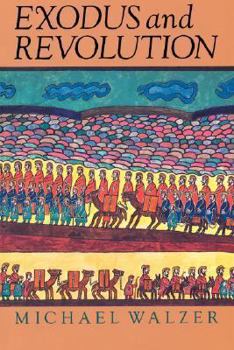Exodus and Revolution
Select Format
Select Condition 
Book Overview
A noted political philosopher offers a moving meditation on the political meanings of the biblical story of Exodus -- from oppression to deliverance and the promised land.
Format:Paperback
Language:English
ISBN:0465021638
ISBN13:9780465021635
Release Date:October 1986
Publisher:Basic Books
Length:192 Pages
Weight:0.65 lbs.
Dimensions:0.6" x 5.9" x 8.8"
Related Subjects
Americas Bible Study Bible Study & Reference Christian Books & Bibles Criticism & Interpretation Education & Reference Government History Humanities National Old Testament Political Science Politics & Government Politics & Social Sciences Reference Religion Religion & Spirituality Religious Studies Social Sciences WorldCustomer Reviews
2 ratings
Exodus and Revolution
Published by Thriftbooks.com User , 14 years ago
This book has become a classic. It is readable, inspiring and a great supplement to the Passover Haggadah. My old copy was falling apart from use so I ordered a new one for my library in time for Passover.
Covenant Theology = Social Contract Theory?
Published by Thriftbooks.com User , 18 years ago
Walzer is a Princeton Professor who writes in this book that Thomas Hobbes, John Locke, and Rousseau have their precursors in the Torah's Exodus narrative. Walzer is not interested in the implications of Biblical Higher Criticism, nor is he interested in theology per se. Rather, he looks at how the Exodus narrative out of Egypt has been used for social arguments. He then goes on to find those aspects within the narrative and elaborate. He writes, "I don't mean to disparage the sacred, only to explore the secular: my subject is not what God has done but what men and women have done, first with the biblical text itself and then in the world, with the text in their hands." Walzer does a good job writing how covenant theology developed in the Torah: from Noah, to Abraham, to Moses and the Israelites. He says that the post-Sinai covenant is in "good Rousseauian fashion, out of the wills of independents." He says that "revolution" is the narrative of "oppression, liberation, social contract, political struggle, new society (danger of restoration)." Thus the process of revolution is adeptly reveled in narrative. This is why the Exodus narrative has been a milestone for Western culture's progress. Walzer concludes with an adept discussion on Zionism, where he finds that two broad arguments: "Exodus Zionism" and "messianic Zionism" (the former, politically left, the latter, politically right) both appeal to canonical text. According to Walzer, these two competing views and how they interpret the Torah are responsible, in large part, for the current tensions in Palestine. There is too much here to review (e.g. the provocative critique in the Exodus narrative that Walzer sees as an implicit critique of Hegel), this book is recommended for those interested in the intersections between theology, political theory, philosophy, and biblical studies.





